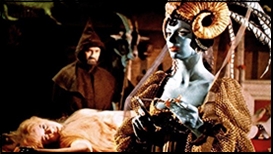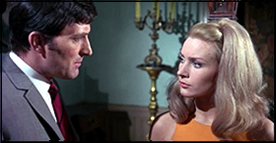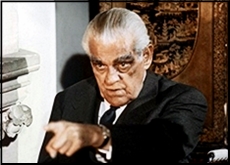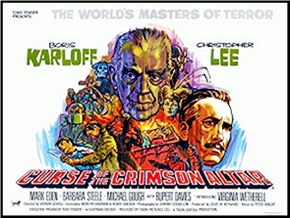Fri 29 May 2020
A Movie Review by Jonathan Lewis: THE CURSE OF THE CRIMSON ALTAR (1968).
Posted by Steve under Horror movies , Reviews[2] Comments

THE CURSE OF THE CRIMSON ALTAR. Tigon Pictures, UK, 1968. America International, US, 1970, as The Crimson Cult. Boris Karloff, Christopher Lee, Mark Eden, Barbara Steele, Michael Gough. Based on a story by Jerry Sohl and (uncredited) “The Dreams in the Witch House,†by H. P. Lovecraft. Director: Vernon Sewell.
The Curse of the Crimson Altar, a psychedelic gothic horror film which was released in the United States under the title The Crimson Cult opens with a shocking scene of violence. There’s a blue-faced witch (portrayed by the legendary horror queen Barbara Steele), a bunch of scary looking characters dressed in robes and black leather, and a woman being whipped. And it appears as if this motley crew is trying to force a rather mild-mannered Englishman to sign his name in a large book. What in blazes is going on, you ask yourself.
Well, it turns out that there’s a cult at work. A cult which, based on the movie’s mise-en-scène, seems to really have a deep attachment to the color red. Crimson, to be specific. And as any savvy consumer of films dealing with the occult or “Satansploitation,†knows all too well, an innocent person is almost certainly going to be swept up in the cult’s unheavenly deeds!

Enter Robert Manning (Mark Eden), an antiques dealer in London. His brother has gone missing and he’s determined to find out where his sibling has gone. What Manning doesn’t know is that his brother was the aforementioned mild-mannered Englishman swept up into the cult’s demonic grasp. So, much like in The Wicker Man (1973), which this horror film clearly presages, a man searches a small somewhat isolated village for a missing person, only to be the unwitting mark of a pagan cult. And much like in The Wicker Man, the cult’s leader is portrayed by the irreplaceable Christopher Lee. Seeing Lee’s entrance into the movie is a delight; you know at that point, that no matter how clunky or formulaic the movie might turn out to be, that you’re going to at least benefit from his singular theatrical presence.

But Lee is not the only famous horror actor to make an appearance. Boris Karloff, in one of his final roles, portrays Professor John Marsh, a leading scholar of witchcraft. Although Karloff was in the final years of his life, his speech and cadence were spot on. It’s pure unadulterated Karloff.
As you may have surmised by my comments so far, it’s pretty clear that I thoroughly enjoyed The Crimson Cult. But it is a good film? Yes and no. It’s definitely a little predictable and Eden is not a particularly dynamic lead. As a Tigon production, it also doesn’t have the unique Hammer film aesthetic. But if you take it for what it is, you might have a little fun with it. There’s definitely a late 1960s psychedelic vibe to the whole affair – an attempt to capitalize on the counterculture era? – and the movie benefits from never taking itself too seriously. I read online that the script was inspired by H. P. Lovecraft’s “The Dreams in the Witch House†(1933). That may very well be the case, but it was not listed in the credits.

May 29th, 2020 at 7:18 pm
It certainly works for what it is. Not great, but it hits the marks, delivers, and has a fine cast, but with Eden in it I kept expecting Ian Carmichael to show up as Lord Peter (Eden was Inspector Parker).
Karloff, Lee, and Steele are a good bet in any film and come through here.
May 29th, 2020 at 7:28 pm
From the trailer, I’d have to agree with Jon that the movie doesn’t hold up against the Hammer standard, but as you say, David, who could turn down the chance to see a movie with Boris Karloff, Christopher Lee, and Barbara Steele in it?